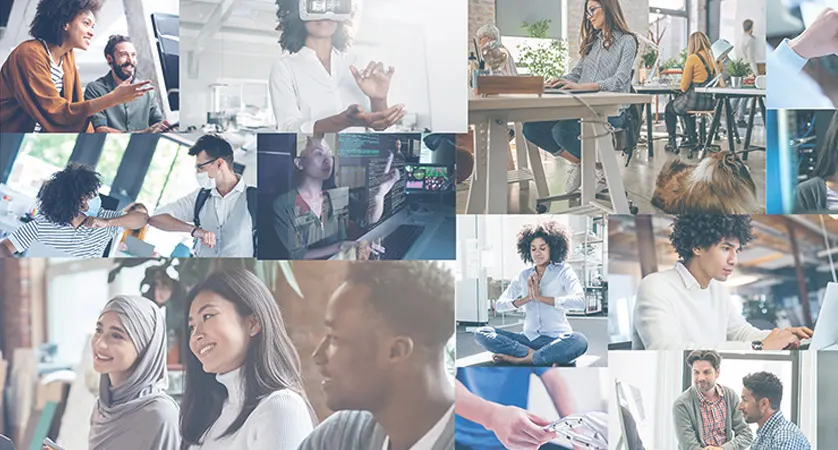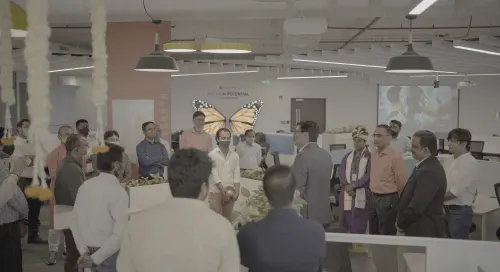Future Workplace Trends for 2023 and Beyond

The post-pandemic world has changed the workplace by popularizing hybrid and flexible work models, emphasis on mental health, and other practices. Terms like “quiet quitting” and quiet hiring” are fetching attention and attractiveness in the sphere of workspace these days. Is catching up with these trends a good idea? Well, it is but staying ahead of these workplace trends is an even better idea.
"By failing to prepare, you are preparing to fail" as quoted by Benjamin Franklin
The pandemic has shown us the importance of preparedness and with fast-pacing changes, mere responsiveness won’t help; it can help you survive but to lead we have to be ahead. In this blog, we will explore the top future workplace trends for the present year and for the years to come after.
Focus on Employee Well-being
We see a growing awareness of the importance of employee well-being in the workplace. This has led to numerous changes and initiatives aimed at promoting the health and happiness of employees. One such change is an increased emphasis on providing support for mental health. This is done through counselling services, and by offering resources and information on psychological health, and creating a supportive work environment. All this encourages open communication and a positive work environment. Another change is the adoption of flexible work schedules that allow employees to better balance their work and personal lives. The trend of remote work, flexible hours, and job sharing ensures to improve the quality of life of the employee.
By providing employees authority and freedom over their schedules, companies can help reduce stress and improve overall job satisfaction. Many companies are also implementing wellness programs and initiatives within the workplace by introducing fitness classes, healthy eating options, and stress reduction workshops. Promoting healthy habits and behaviors can improve the well-being of employees. Overall, these changes reflect the change in the temperament of companies towards employees in the modern workplace.
Continued Technological Advancements
Offices and companies are constantly evolving due to continued technological advancements. Artificial Intelligence (AI) and automation in the workplace can help improve efficiency by automating repetitive tasks and providing intelligent insights that can aid in decision-making. Another trendsetter is Augmented Reality (AR) and Virtual Reality (VR) applications. These technologies can provide immersive training experiences, enhance collaboration, and improve product visualization by allowing employees to interact with virtual objects realistically.
Besides, the integration of the Internet of Things (IoT) devices are also becoming more prevalent. These devices can help improve efficiency by providing real-time data and enabling remote monitoring and control of various systems. Cost reduction and optimization of operations can be achieved through this. The threshold of technological advancements is helping to drive innovation and improve productivity in the prevailing workplace.
Upskilling and Reskilling Initiatives
Upskilling and reskilling initiatives are becoming increasingly important in the future workplace. As market circumstances, technologies, and organizational requirements evolve, the skills that are in demand will also change. Some jobs might cease to exist, while others will transform to be different from the present condition.
Training employees in new skills and updating their current ones help companies adapt to current changes and prepare them for future developments that may require flexibility. The World Economic Forum states that such training is vital for economic recovery after Covid-19, with the potential to increase global GDP by over $6 trillion and create 5.3 million new jobs by 2030.
Diversity, Equity, and Inclusion (DEI) Focus
There is a growing emphasis on DEI initiatives in the workplace. Companies are promoting inclusivity and diverse representation, addressing unconscious bias, and fostering a culture of equality. These initiatives include analyzing pay equity, forming employee resource groups, and offering DEI training. These efforts are aimed at creating an equitable work environment for all employees.
Additional initiatives involve practicing unbiased hiring, promoting mentorship and sponsorship opportunities, providing talent development programs for underrepresented groups, organizing DEI educational events, and regularly updating progress. Companies implement a variety of DEI initiatives in the workplace to create a more inclusive environment.
Conclusion
Overall, future workplace trends will witness a myriad of transformations. The importance of employee well-being in the workplace uppermost. Hence various initiatives are rolled out to promote the health and happiness of employees. AI and automation can help improve efficiency in the workplace. Upskilling and reskilling initiatives are becoming increasingly important. Organizations that can adapt to changing workplace dynamics are more likely to remain competitive and drive innovation forward.
On the other hand, organizations that remain stagnant and don’t change can quickly be left behind by the competition. Being adaptable is important when working on projects, developing strategies, and implementing different approaches to meeting goals. By showing adaptability skills, you demonstrate how motivated you are to try new things and learn new skills. Staying informed and agile in the evolving work environment is crucial for organizations to thrive in a rapidly changing world. Flexibility and adaptability can deliver cost savings, increased productivity, enhanced job satisfaction and most importantly, the ability to thrive in a rapidly changing world.
ManpowerGroup’s Thought leadership strives to create and deliver innovative workforce solutions through its research and insights. It also gives voice to issues, trends, and challenges that impact organizations and individuals across the globe. To know more about our research, write to us on [email protected]

























